Welcome to our big book of Irish slang words and phrases.
This collection of mad and mighty Irish expressions was put together over the course of 4 years.
It contains common Irish slang that’ll be familiar to you, like ‘Craic’, along with some of the more confusing Irish phrases, like ‘Stall the ball’.
How it was put together: I’ve used the Irish phrases that I heard while growing up in Ireland. I also asked asked the 250,000+ Irish Road Trip community what their favourite Irish terms were.
Famous Irish slang words
Not all Irish phrases are equal – our first chapter looks at the most famous Irish terms, like ‘Grand’ and ‘Feck’.
We’ve also guides to Irish proverbs and Gaelic phrases that you can dive into later. Enjoy!
1. Craic
The word ‘Craic’ can be used in a couple of different ways. The first is its use to describe something as ‘Fun’, for example, ‘Last night was some craic!’.
You can also ask ‘What’s the craic/Any craic?’ as a greeting, which means ‘What’s going on?’ or ‘Any news/gossip?’.
2. Grand
‘Grand’ is one of the more confusing Irish slang words as the tone and context in which it is used will change its meaning. It can be used to describe something that’s good or OK.
For example, ‘That’s a grand bit of sunshine’. The confusion arises when someone uses ‘Grand’ as a response to ‘Are you/is it OK?’. In this instance, people use ‘Grand’ as a way of avoiding discussion.
3. Banjaxed
‘Banjaxed’ is one of several Irish phrases used to describe something/someone as ‘Broke/in a bad way’. For example, ‘That oven is banjaxed’ or ‘I was banjexed this morning after those pints last night’.
This is one of the older Irish terms and it can be traced back as far as 1929 when Sean O’Casey used it in the play ‘Juno and the Paycock’.
4. Feck
Made famous by the Father Ted series on TV, ‘Feck’ is arguably one of the most famous Irish slang words, however, its meaning varies depending on the user.
Some use it as a less bold way of saying ‘F*ck’ while others use it to describe someone they don’t like/someone who has annoyed them, for example, ‘That fecker short changed me by a Euro!’.
5. Yoke
We use the word ‘Yoke’ as a substitute for the word ‘Thing’ or to describe someone that we don’t like. For example, ‘Don’t forget the yoke’ or ‘Karen’s brother is some yoke!’.
Interestingly enough, ‘Yoke’ is one of the older Irish terms with it first popping up in the 1894 book ‘Kerrigan’s Quality’, by Dubliner Jane Barlow.
6. Culchie
A ‘Culchie’ is someone that’s from rural Ireland. It’s thought that this word comes from the Irish for ‘Back of the house’, which is ‘Cúl an tí’.
It was a popular custom in rural Ireland to enter a house via the back door, rather than the front, to avoid dragging dirt in through the more formal entrance.
It’s thought that the word ‘Culchie’ stems from Cúl an tí’ and is used to describe people who practice/are perceived to practice this custom.
7. Fine
‘Fine’ is one of the more confusing Irish slang terms. It’s usually used, like ‘Grand’, as a way of fending off further discussion, for example, ‘You’re clearly angry – what’s wrong?’ ‘Nothing. It’s fine’.
It can also be used to describe someone you find attractive, for example, ‘They’re a fine thing’.
8. Gobsh*te
Few Irish words have achieved widespread fondness like ‘Gobsh*te’, a bit of slang generally used to describe someone foolish.
For example, ‘I don’t believe it – that gobsh*te has put bleach on the carpet instead of water’.
9. Eejit
One of the more famous Irish insults, an ‘Eejit’ is someone that’s foolish or someone that has done something foolish.
For example, ‘Yer man is some eejit – he stuck a load of petrol into the car and sure hasn’t it got a diesel engine!’.
10. Deadly
Commonly used in everyday Dublin slang, ‘Deadly’ is Irish slang for ‘Good/great’.
For example, ‘This Irish phrases guide would be deadly if it wasn’t for those fec*in ads!’.
11. Giving out
Although many of us in Ireland think ‘Giving out’, which means ‘To scold/complain’, has a fairly obvious meaning, it’s one of many Irish slang words that causes widespread confusion to visitors.
It’s believed that it comes from the Irish words ‘Tabhairt amach’, which mean to ‘Give out’. For example, ‘Mary was giving out about what you did to her window!’.
12. Slagging
‘Slagging/to slag’ means to insult someone but usually in a way that isn’t meant to hurt that persons feelings.
For example, you might use one of the funny Irish sayings as a slag, like ‘If you were any longer you’d be late’.
13. The jacks
‘The jacks’ are what many of us call the toilet in Ireland. For example, ‘I’ll be there in a minute I need to use the jacks’.
Interestingly enough, it’s thought this slang come from an Irish fella called ‘Jack Power’ who invented the first multi-toilet cubicles (see more random facts about Ireland)!
Irish phrases to describe someone you dislike
Chapter two of our Irish lingo guide looks at terms used for someone or something that you don’t like.
You’ll find many more of these in our Irish insults guide, but here are the ones that are most commonly used.
1. Boll*x
‘Boll*x’ or ‘Boll*cks’ are Irish slang words that refer to a man’s neither regions. It can be used in several ways and the intended meaning will depend on tone/context.
For example, ‘He’s some boll*x’ might refer to someone you dislike if the tone is negative, but it could refer to your best friend if the tone is positive.
2. Pox
A ‘Pox’ is someone that’s a nuisance. For example, He’s a miserable little pox’.
There’s some Dublin slang variations of this including ‘Pox bottle’ which I heard my dad use when I was a kid.
3. Gombeen
‘Gombeen’ is one of the more unusual Irish idioms. It comes from the Irish word ‘Gaimbín’ which translates to ‘Monetary interest’ and it was originally used to describe money lenders.
We use ‘Gombeen’ to describe Del Boy Trotter types, i.e. wheeler dealers looking to make money off of you.
4. Gobdaw
‘Gobdaw’ is another of the Irish terms used to describe someone foolish or stupid.
For example, ‘Did you hear Bernie’s young fella left the front door open and the place was robbed? He’s some Gobdaw!’.
5. Wagon
One of the first Irish expressions in this guide that’s gender specific, a ‘Wagon’ is used to describe a female that’s acting/acted in a particular way.
For example, ‘My little one won’t sleep at all at night, the little wagon!’.
7. Minus craic
‘Minus craic’ describes a situation or a person that’s no fun (similar to the funny Irish saying ‘Craic vacuum’).
For example, ‘We were at Michael’s 21st last night. There was only four of us there – it was minus craic’.
8. Geebag
Another of the gender specific Irish expressions, a ‘Geebag’ is used to describe a female you dislike.
For example, ‘Mrs. O’Toole gave us about 7 weeks worth of maths homework. What a geebag’.
9. Dope
Now, for our American readers – when we say ‘Dope’ in Ireland, we’re not talking about anything dodgy. In Ireland, ‘Dope’ is another way of describing someone stupid.
For example, ‘Her new fella was here last night. Talk about a dope’.
10. Sap
The use of the word ‘Sap’ dates back to 1815 and it’s thought to come from the word ‘Saphead’.
If you call someone a ‘Sap’ in Ireland you’re usually describing them as a fool or a simpleton.
11. Cute hoor
‘Cute hoor’ is one of the older Irish slang phrases and it can be dated back to at least 1983 when it was used in the ‘Evening Herald’ paper to describe two politicians.
‘A cute hoor‘ is used to describe someone that’s relatively crafty and that’s able to mould a situation to benefit themselves.
For example, ‘He’s a cute hoor that fella, always manages to get a free ticket to the concerts in the Phoenix Park’.
12. Gowl
The word ‘Gowl’ is most frequently used as part of Limerick and Northern Irish slang words. It comes from the Irish word for ‘Foreigner’, which is ‘Gall’.
It’s thought that the native Irish would have referred to the English in this way and the term became a word for someone you dislike.
13. Drysh*te
A ‘Drysh*te’ is used to describe a person that is either boring, no fun or whom is deemed to have taken the fun from a situation.
For example, ‘All them lads do is sit in and play the Xbox. They’re a pair of drysh*tes’.
14. Kip
‘Kip’ is one of the more common Irish terms and it’s thought that it comes from the Danish ‘Kippe’, which means ‘Dive/cheap inn/hovel’.
In Ireland, we use ‘Kip’ to describe a place that’s messy/dirty. For example, ‘That hotel was an absolute kip’.
15. Scut
The term ‘Scut’ is thought to come from ‘Scut work’ which was an old way of describing manual labour.
A ‘Scut’ is someone that’s perceived to be a waster or someone with a lower than average intelligence.
16. Sh*tehawk
The term ‘Sh*tehawk’ has a number of meanings. The word was actually given to describe birds that ‘Exhibit scavenging behaviour’.
In Ireland, it’s used in the same was you’d use the word sh*t, for example, ‘He’s some sh*tehawk that one’.
17. Dosser
‘Dosser’ is one of the Irish expressions that you hear in schools around Ireland, and it’s used to describe someone that’s doing anything other than what they should be doing.
You’ll often hear it used to describe people that are lazy and that are avoiding doing any work. For example, ‘Stop dossing and do your work, you little dosser’.
18. Tool
‘Tool’ is one of the less-offensive Irish slang phrases and it’s a less-severe way of calling someone an idiot/clown.
For example, ‘Did you see what she posted on Facebook?! What a tool!’.
19. Melter
In my experience, ‘Melter’ is one of the Dublin slang words but it’s likely used in many parts of Ireland.
It’s used to describe someone that’s annoying. For example, ‘That lad keeps on texting me. He’s a bleedin’ melter’.
20. Langer
‘Langer’ tends to have a few different meanings. Personally, I’ve heard it used most frequently used to describe a man’s neither regions.
However, it’s also used to refer to someone stupid. For example, ‘He’s some langer’. This is an iconic bit of Cork slang.
21. Chancer
If someone is known to be an opportunist, usually in a dubious manner or in a way that’s seen to be dishonest, he’s called a ‘Chancer’.
For example, ‘His father was a chancer as well – he used to sell chickens each Christmas and tell people they were little turkeys’.
22. In bits
You can use ‘In bits’ as Irish slang for drunk. Or you can use it to describe how you feel when you’re hungover.
You can also describe someone you find unnatractive as ‘In bits’, for example, ‘I would go near that lad – he’s in bits’.
23. Thick
‘Thick’ means ‘Stupid’. For example, ‘That thick Kerrie crashed my car’. It can also be used to describe someone that’s annoyed.
‘You’ve a big thick head on you – what’s wrong?!’.
24. Muppet
‘Muppet’ is one you don’t hear too often these days. It’s used to describe someone foolish.
For example, ‘I head you lost your new phone, you muppet!’.
25. Tosspot
‘Tosspot’ is slang from England that’s used in Ireland. Although we use it here to describe someone we dislike, it was originally used to describe someone who drank heavily.
In Middle England, beer was served in a ceramic pot. A ‘Tosspot’ was a word given to someone who drank too much and who ‘Tossed’ back pots of beer.
26. Manky
The word ‘Manky’ is used to describe something that’s dirty. For example, ‘Their kitchen is manky. You’d be safer eating in the jacks’.
27. Dose
If you called a person a ‘Dose’, you’d be referring to them as annoying or a pain in the backside.
You can also refer to a sickness as a ‘Dose’, for example, ‘I’ve had a bad dose on me since I was caught out in the rain’.
28. Hallion
A ‘Hallion’ is someone that’s seen to be useless. It can also mean someone that’s clowning around someone that’s a bit of a rogue.
For example, ‘You’re two kids are a right couple of hallions’.
Slang Irish terms that can be confusing
There are plenty of Irish sayings that leave people that are new to Ireland scratching their head.
Below, you’ll find some of the quirkier Irish expressions, from ‘Yer man’ and ‘Gimme a shot’ to ‘Shifting’ and more.
1. C’mere to me
The Irish slang words ‘C’mere to me’ aren’t actually used to ask someone to come closer to you – they’re generally used before you ask a question.
For example, ‘C’mere to me, what was that new mechanic like.
2. Eat the head off
If you were to ‘Eat the head off’ off someone it would mean that you scolded them in an aggressive manner.
For example, ‘I was so annoyed I ate the heads off the pair of them!’.
3. The messages
‘The Messages’ is a slang term for ‘Groceries’ and it comes from a time when people would get their messages (telegrams and letters) from the Post Office where they also sold groceries.
For example, ‘I’m going for the messages – I’ll be home in an hour!’.
4. The craic was 90
This is another of the Irish phrases to describe a situation that you found fun.
For example, ‘We dropped into the local on Sunday – the craic was 90 after the game!’.
5. Gimme a shot
‘A shot’ is another way of saying ‘A go’. If someone asks you to give them ‘A shot of’ something, they’re asking to use it.
For example, ‘Those gloves look grand and warm – gimme a shot of them for a minute I’m freezing!’.
6. Sure look
Few Irish expressions cause confusion like ‘Sure look’, which is used, in my experience, as a way of saying ‘Ah, well!’.
For example, ‘Did you hear they lost the match? That’s us gone until next year!’. ‘Ah, sure look – they did their best’.
7. Shifting/meeting
These are two Irish phrases used to describe kissing. Growing up in Dublin in the 90s, you’d hear ‘Will you meet him/her’ when someone was being asked to kiss someone.
‘Shifting’, in my experience, is generally used by people from more rural parts of Ireland (again, this is just my experience).
8. Yer man/yer one
‘Yer man/yer one’ is a way of referring to a man/woman that you either aren’t overly familiar with or that you aren’t too fond of.
For example, ‘The state of yer man there in his blue leather jacket’.
9. Will I, yea/I will, yea?!
One of the Irish expressions that abides by absolutely no rules of the English language, we use ‘Will I, yea’ as a response to an instruction that we have no intention of following.
For example, ‘You’ll be getting off your hole and emptying the bins in 5 minutes’. ‘Will I, yea?!’.
10. Acting the maggot
If a person is ‘Acting the maggot’ they’re messing around/dossing… i.e. they’re not doing what they’re supposed to be doing.
For example, ‘That young lad was in here last night acting the maggot’.
11. Lash
‘Lash’ is one of many Irish terms that can be used in several different ways. It can be used to describe quick movement, for example, ‘Give yourself a lash we’re late’ or ‘Lash that in the bin’.
It can also be used to describe someone you fide attractive, for example, ‘She’s a lash’.
12. Ah, here!
‘Ah, here’ is generally used when you’re outraged about something or if you’re loosing patience, for example, ‘Ah, here – I’m sick of your bad language’.
Or, for example, if you were witnessing a fight, ‘Ah, here – leave it out’.
13. G’way!
‘G’way’ is one of the less common Irish slang words and it’s used as a way of saying ‘No way/you’re joking/you’re kidding’.
For example, ‘Did you hear I won the lotto?’ G’way?! Are you serious?’.
14. Sucking diesel
The phrase ‘Sucking diesel’ is used to describe a situation that’s moved from less favourable to favourable.
For example, if a person is in a car that won’t start and eventually it does, ‘Now we’re sucking diesel’ would be appropriate.
15. Codding
One of several Irish terms that’s used in several other countries, ‘Codding/to cod’ means ‘Joking/to joke/to have on’.
For example, ‘Terry’s Irish jokes are gas, to be fair!’ ‘Are you codding me? He couldn’t tell the time, never mind a joke’.
16. Shaping/shaper
‘Shaping’ is a another way of describing someone that’s walking with a strut, usually in a very cocky manner. You can describe someone walking like this as a ‘Shaper’.
Or you could say ‘Look at yer many throwing shapes‘.
17. Sorry?
In most languages, ‘Sorry’ is used for apologising to someone. In Ireland, ‘Sorry?’ is one of several Irish expressions that doesn’t follow conventional use of the English language.
‘Sorry?’ is used as a reply, usually to a question or a statement that has angered you. For example, ‘If you do that again you’ll get a slap’ ‘Sorry? Say that again!’.
18. He/she is your only man/woman!
If you hear someone saying ‘Ah, he’s your only man’, the person saying it is usually recommending that person for a particular task/situation.
For example, ‘I need someone to give say an Irish blessing at the wedding’ ‘Ah, Tom’s your only many for that kind of thing’.
19. Up to 90
‘Up to 90’ means flat out busy doing something. You’ll often hear this one used in response to questions like ‘How was work today?’.
The response would then be ‘Ah, sure I’ve been up to 90 since half 7’.
20. Leg it
‘Leg it’ is Irish slang for ‘Run’. For example, ‘The security guard is after us – leg it’.
21. Donkeys years
‘Donkeys years’ is used to describe a long period of time that has passed.
For example, ‘Ah, Ollie – it’s great to see you, I haven’t see you around in donkeys years’.
22. Fair play
‘Fair play’ is generally used as a response to something that you find favourable or to a good deed.
For example, ‘I’m collecting money for charity’ ‘Ah, fair play’.
23. Stall the ball
If you ask someone to ‘Stall the ball’ you’re asking them to hang on/wait.
For example, ‘Here, stall the ball – I’ll be ready in 10’.
24. Gas
‘Gas’ is Irish slang for funny. You’ll hear a situation being described as ‘Gas’, for example, ‘Last night was gas craic’.
You’ll also hear someone deemed to be funny as ‘Gas’, for example, ‘He’s a gas man’.
25. Jammy
Another of the more confusing Irish sayings, ‘Jammy’ is used to describe someone as lucky/flukey.
For example, ‘You won the game again?! You’re a jammy hoor’.
26. Lob the gob
‘Lob the gob’ is another of the Irish phrases that’s used to describe kissing someone.
For example, ‘He’s in trouble today – wasn’t he seen lobbing the gob on some wan last night’.
Irish slang phrases for greeting someone
Our next chapter is filled with Irish sayings that are used to greet people.
You’ll find a fair few weird and wonderful Irish phrases below, some of which are straightforward and others that definitely aren’t.
1. What’s the craic/story?
Arguably the most common Irish slang words for greeting someone, ‘What’s the craic/story?’ means ‘How are you/any news/what’s going on?’.
For example, ‘Shay – what’s the craic? I haven’t see you in ages?’.
2. How’s she cutting?
One of several Irish phrases that stems from farming, ‘How’s she cutting?’ is now used in the same way that you’d use ‘What’s the story?’, however, it wasn’t always that way.
Back in the day, you’d usually ask someone ‘How’s she cutting’ during the harvest season to enquire about the the conditions for crop cutting.
3. Well
‘Well’ tends to come before one of the other Irish terms that we use for greeting someone.
For example, ‘Well, how are you getting on?’. It doesn’t really mean anything, but it’s used frequently.
4. Hows-a-going?
Nothing too surprising with this one – it’s simply ‘How is it going?’ but it generally comes out as ‘Howsagoin?.
For example, ‘Tara – howsagoin? Haven’t seen you about in ages!’.
5. Story horse?!
This is a bit of Dublin slang that’s used to greet someone and it roughly means ‘How’s it going/how are you?’.
Like plenty of the Irish slang words in this guide, there’s no clear indication as to where this originated.
6. How ya getting on/How’s the form?!
‘Well, how ya gettin on/how’s the form?’ are more Irish sayings that simply mean ‘How are you/things?’.
You’ll often hear ‘Well’ stuck in front of it.
7. Bout Ye?
‘Bout ye?’ are some common Northern Irish slang words that mean ‘How are you?’.
For example, ‘Bout ye, chief! Fancy a pint?’.
Funny Irish expressions for drunk and hungover
The next chapter is packed with Irish sayings that describe being drunk or being hungover.
There isn’t one bit of Irish slang for drunk – there are several. And they tend to vary from county to county.
1. Flutered
Short and sweet and with no clear indication of origin, ‘Flutered’ is one of the more common Irish terms for drunk.
For example, ‘I was flutered after that last whiskey’.
2. Locked/legless/banjaxed/buckled/scuttered/Baloobas
‘Locked’ doesn’t have anything to do with ‘Closed’ – it’s a way of describing being very drunk.
For example, ‘You were locked. At one point you announced you were going to give an Irish toast, but you just started singing the Wolfe Tones’.
3. In a heap/in a hoop
‘In a heap/hoop’ is one of the Irish idioms used to describe being hungover. For example, ‘I’m in a heap – I feel as sick as a plane to Lourdes’.
4. In rag order/in ribbons
If you were ‘In rag order/ribbons’ you overindulged and you were drunk. It can also be used to describe a hangover.
For example, ‘I should never drink vodka. My heads in ribbons’.
5. Mouldy/mullered
One of the Irish colloquialisms I’ve only ever heard from a group of friends from Louth, this also means you were very drunk.
For example, ‘I had 2 bottles of wine. It’s no wonder I was mouldy”.
6. Out of your tree/off your head
Potentially one that’s part of Dublin slang, ‘Out of your tree’ is a colourful way of saying you were more than merry.
For example, ‘I was so out of my tree I tried cooking chicken in the toaster’.
7. Hammered
Another of the Irish expressions with no clear origin, ‘Hammered’ also means very drunk.
For example, ‘I called him a what? Ah, damn – I must have been hammered’.
8. Shook
One of several funny Irish sayings used to describe a hangover, you’ll often hear someone say ‘I’m as shook as a hand at mass’.
Irish slang words and phrases for good and great
The next chapter in our Irish sayings guide takes a look at the different Irish slang for good and great.
There’s plenty of Irish terms for describing someone in a favourable way and here are the most common.
1. Savage
One of the more common Irish terms for good is to describe something as ‘Savage’.
For example, ‘That chicken fillet roll was savage’.
2. Bang on
You’ll hear good situations and people being called ‘Bang on’.
For example, ‘The new guy that started is bang on’.
3. Class
Another of the popular Irish phrases, ‘Class’ can be applied to people, places or things.
For example, ‘Ah, that movie was class’.
4. Unreal
‘Unreal’ can be used as a response to something you deem good or it can be used to describe something you think is great.
For example, ‘You passed the exam?! That’s unreal!’.
5. Cracking
‘Cracking’ is another of the Irish expressions used to describe something as ‘Brilliant’.
For example, ‘That’s a cracking day out there today’.
6. Dead on
The only people that I know who use ‘Dead on’ are from county Antrim. It’s used to describe a person or thing you think is great.
For example, ‘Melissa’s fella is dead on, so he is’.
7. Sound
You can use ‘Sound’ as a way of saying ‘Thanks’. For example, ‘Sound for collecting me – I would have had to walk otherwise’.
8. Quality
If something is ‘Quality’, it’s very good. For example, ‘That new show with Brendan Gleeson is quality’.
9. Rapid
Arguably one that’s mainly part of Dublin slang, rapid doesn’t describe fast movement – it describes something you think is ‘Deadly’.
For example, ‘I got a new tracksuit last week. It’s rapid looking!’.
Dublin slang
There’s a hape of Dublin slang that doesn’t tend to get used by people from outside of the capital.
Growing up in Dublin, I heard the below used as part of everyday life (note: these many not be exclusively Dublin slang words).
1. Whopper
If you’re describing something as ‘Whopper’ you’re describing it as ‘Amazing/great/incredible’.
For example, ‘This Dublin slang guide would be whopper without those damn ads!’.
2. Delirah
‘Delirah’ isn’t really Dublin slang, it’s more how the word ‘Delighted’ sounds with a heavy Dublin accent.
For example, ‘Ah, I’m delirah for the pair of ye’.
3. Mot
‘Mot’ is generally a way of referring to the girl/woman that you are in a relationship with. You will, at times, hear people use it as Irish slang for girl or woman.
For example, ‘I’m taking me mot to the pictures’. The pictures is another chunk of Dublin slang for ‘The cinema’.
4. Janey Mack
‘Janey Mack’ is one of the more famous Irish idioms and it appeared in the book ‘Ulysses’ by James Joyce.
It is used as an alternative to being blasphemous and taking the Lord’s name in vein.
5. Scarlet
‘Scarlet’ is Dublin slang for ‘Embarrassed’ and it’s used in a couple of ways. The first is as a response to someone telling you about an embarassing situation, for example, ‘Ah, scarlet for your ma for having ye’.
The second is to describe yourself as being embarrassed, for example, ‘I fell over leaving the shop – I was scarlet’.
6. Bogger
Now, I’m not sure if this is exclusively Dublin slang, but I’ve never heard anyone from outside of Dublin using it.
A ‘Bogger’ is used to describe someone from rural Ireland, usually one who lives near a bog.
7. Get up outta that
Another of the more unusual Irish sayings, ‘Get up outta that’ is used as a response to a statement that you don’t believe, for example, ‘I’m going on a date with an actress’ ‘Ha, get up out of that – you are in your hole’.
It can also be used in a situation where you’re trying to get some to stop doing something/move, for example, ‘Get up out of that you little scrote – I saw you trying to steal those bikes’.
8. Get outta that garden
Similar to the previous bit of Dublin slang, this is used when you don’t believe someone or when you’re trying to get someone to stop doing something.
9. Brutal
‘Brutal’ has several different meanings. For example, it can be used to describe feeling bad, ‘I ate his lunch – I feel brutal about it’.
Or it can be used to describe a bad act, for example, ‘They lost – they played brutal’.
Northern Irish slang phrases
There are a handful of Northern Irish slang phrases that you’ll only really hear in the six counties (see our guide to Northern Ireland vs Ireland if you’re confused).
We’ve had a few emails since adding this section to say that these are Belfast slang terms, so keep that in mind.
1. Bake
‘Bake’ is slang for your face. For example, ‘Shut your bake, you clown’.
2. Beamer
Another of the Irish sayings used to describe being embarrassed is ‘Beamer’.
For example, ‘It was definitely Colin. Look at him pulling a beamer’.
3. Bogging
‘Bogging’ is used to describe something as ‘Dirty’. For example, ‘The smell off those runners. Your feet must be bogging’.
4. Dander
If you’re going for a ‘Dander’, you’re going for a ‘Walk’, usually at an easy pace.
For example, ‘C’mon. Let’s get out for a dander and get some fresh air’.
5. Peeler
One of the stranger Irish sayings, a ‘Peeler’ is a word given to a member of the police.
For example, ‘Sh*te, put the cans away. There are two peelers coming up the road there’.
6. Houl yer whisht
‘Houl yer whisht’ is Irish slang for ‘Be quiet’. For example, ‘Hey – houl yer whisht in there. I can’t hear the radio!’.
7. Ogeous handling
Another of the more unusual Irish sayings, ‘Ogeous handling’ is used to describe a ‘Tricky situation’.
For example, ‘Remember the time Micky got caught moving the cow in the back of his Ford Focus?’ ‘Oh, I do. It was some ogeous handling’.
8. Up to high doh
If you describe someone as being ‘Up to high doh’ you’re saying that they’re ‘Excited’.
For example, ‘He had a bag of skittles and three bottles of Coke an hour ago – he’s been up to high doh ever since’.
Irish idioms for describing the weather
The last chapter in our common Irish phrases guide looks at Irish slang words that are used to describe the weather.
Now, as the weather in Ireland is a bit mental at the best of times, we have a fair few ways of referring to it.
1. It’s a soft day
One of the more confusing Irish idioms, if you describe a day as ‘Soft’ you’re saying that it’s misty with light rain.
For example, ‘It’s a lovely soft day – make sure you bring a brolly!’.
2. It’s a good day for drying
‘A good day for drying’ is used to describe a nice dry day. ‘Drying’ refers to drying wet clothes outside.
For example, ‘Finally, after all that poxy weather, we’ve a good day for drying’.
3. It’s fierce mild out there
You’ll often hear people describe a fine, warm day as ‘Fierce mild’.
For example, ‘I’m sweating – it’s fierce mild out there now’.
4. It’s lashing/p*ssing down/out
One of the more common Irish terms for heavy rain is to describe it as ‘P*ssing/lashing/pouring/piddling down’.
For example, ‘It’s been piddling down all morning – the place is flooded’.
5. It’s spitting
If there’s light rain falling, it’s known as ‘Spitting’.
You’ll hear people saying ‘It’s spitting out’ or ‘It’s spitting rain’.
6. The sun is splitting the stones
One of the more common Irish expressions for a sunny day is ‘The sun is splitting the stones’.
You’ll often here ‘Stones’ substituted out for ‘Rocks’, too.
7. It’s a day for the fire
This one is used when the weather is cold and wintery and it paints a picture of a beautiful turf fire crackling away.
For example, ‘By God it’s cold out there – it’s a day for the fire!‘.
8. It’s wetter than an otters pocket
There are multiple variations of this, each of which refer to it begin very wet outside.
For example, ‘That’s some rain – it’s wetter than an otters/penguins/Michael Phelps’s pocket’.
Need an Irish slang translator? Ask in the comments!
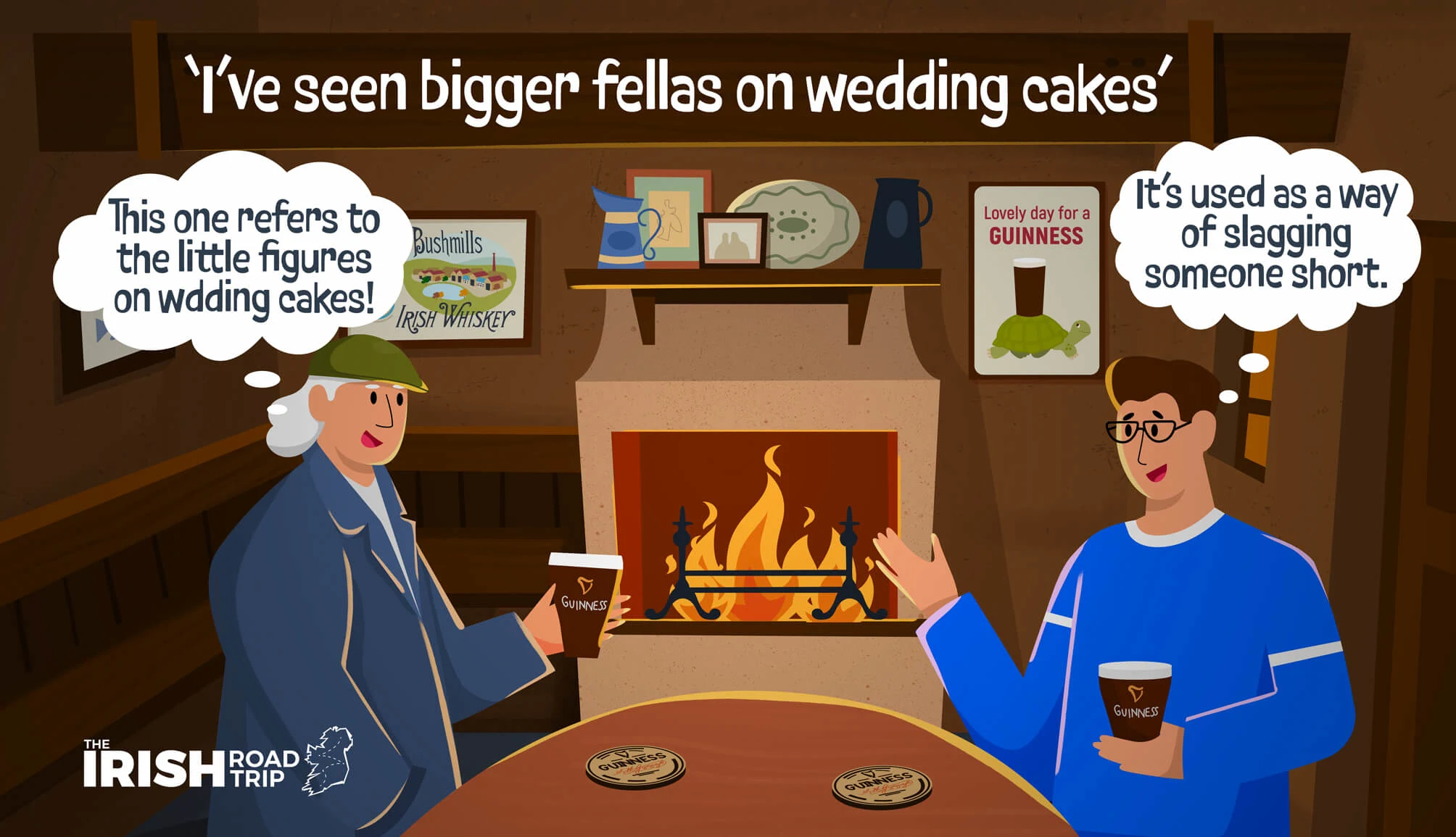
If you’re in need of an Irish slang translator and you can’t find the word you’re looking for below, ask away in the comments and we’ll do our best to help.
Similarly, if there are any Irish colloquialisms that we’ve missed, let us know and we’ll get them added!
Keith O’Hara has lived in Ireland for 35 years and has spent most of the last 10 creating what is now The Irish Road Trip guide. Over the years, the website has published thousands of meticulously researched Ireland travel guides, welcoming 30 million+ visitors along the way. In 2022, the Irish Road Trip team published the world’s largest collection of Irish Road Trip itineraries. Keith lives in Dublin with his dog Toby and finds writing in the 3rd person minus craic altogether.


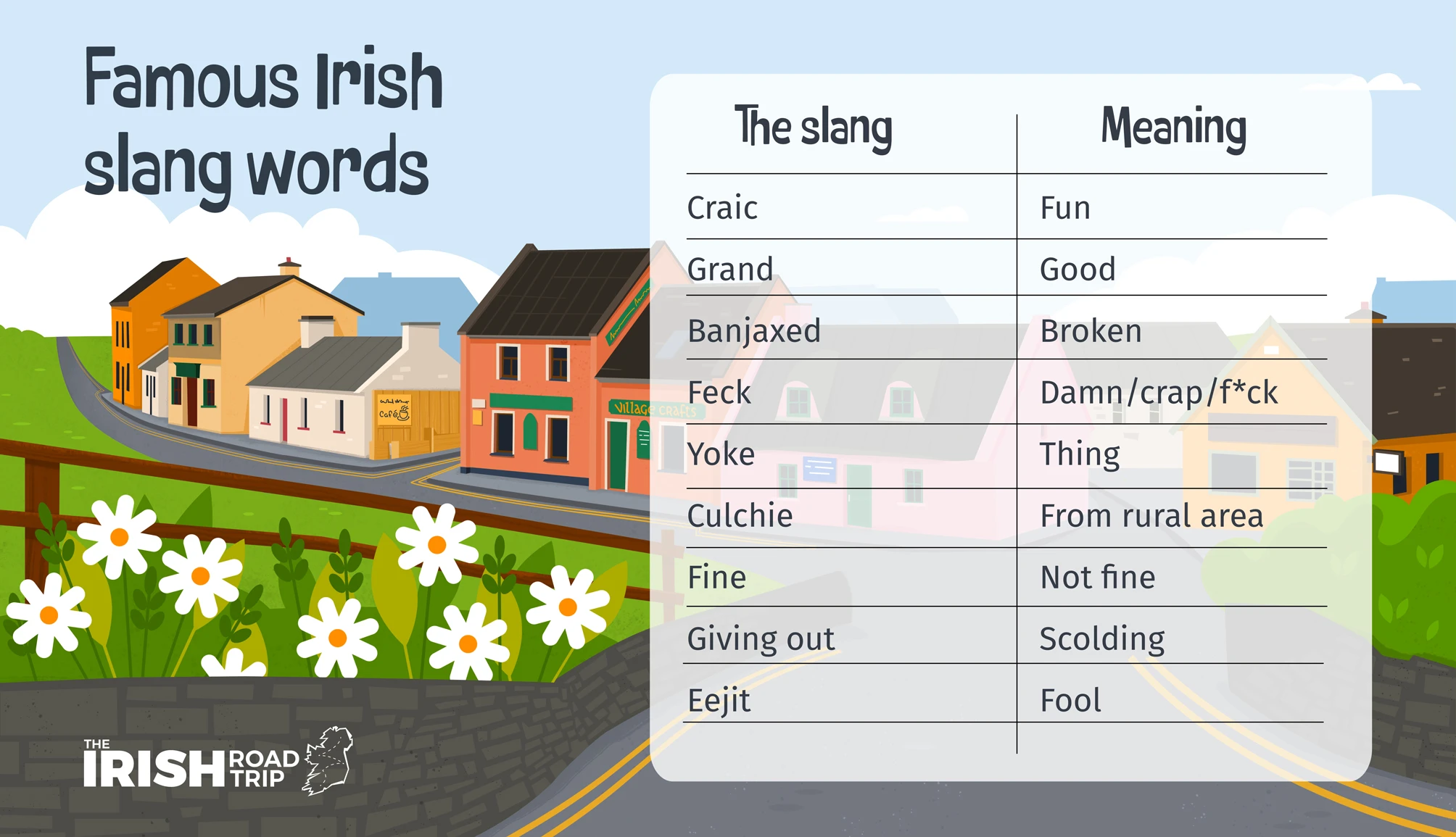
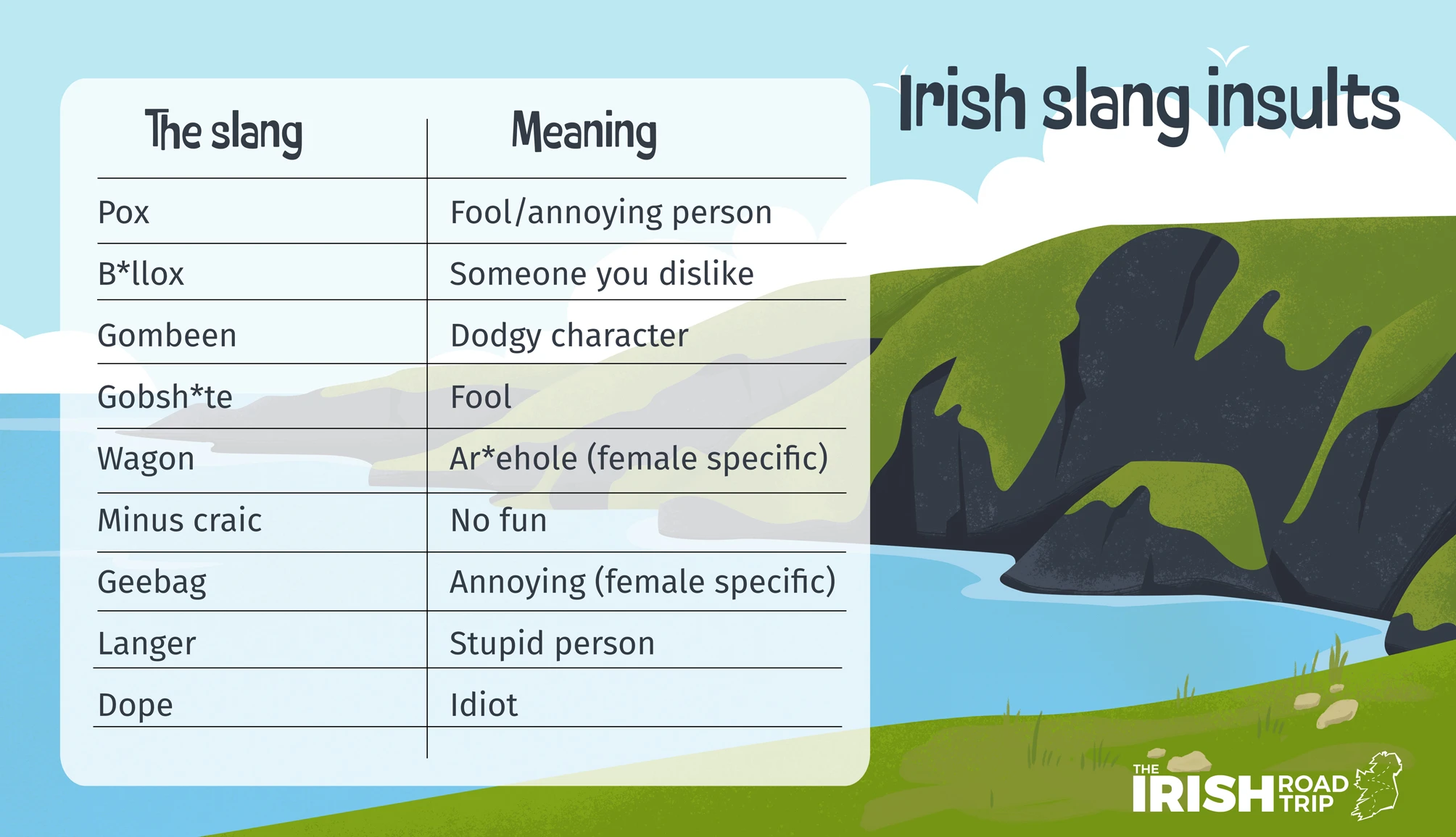
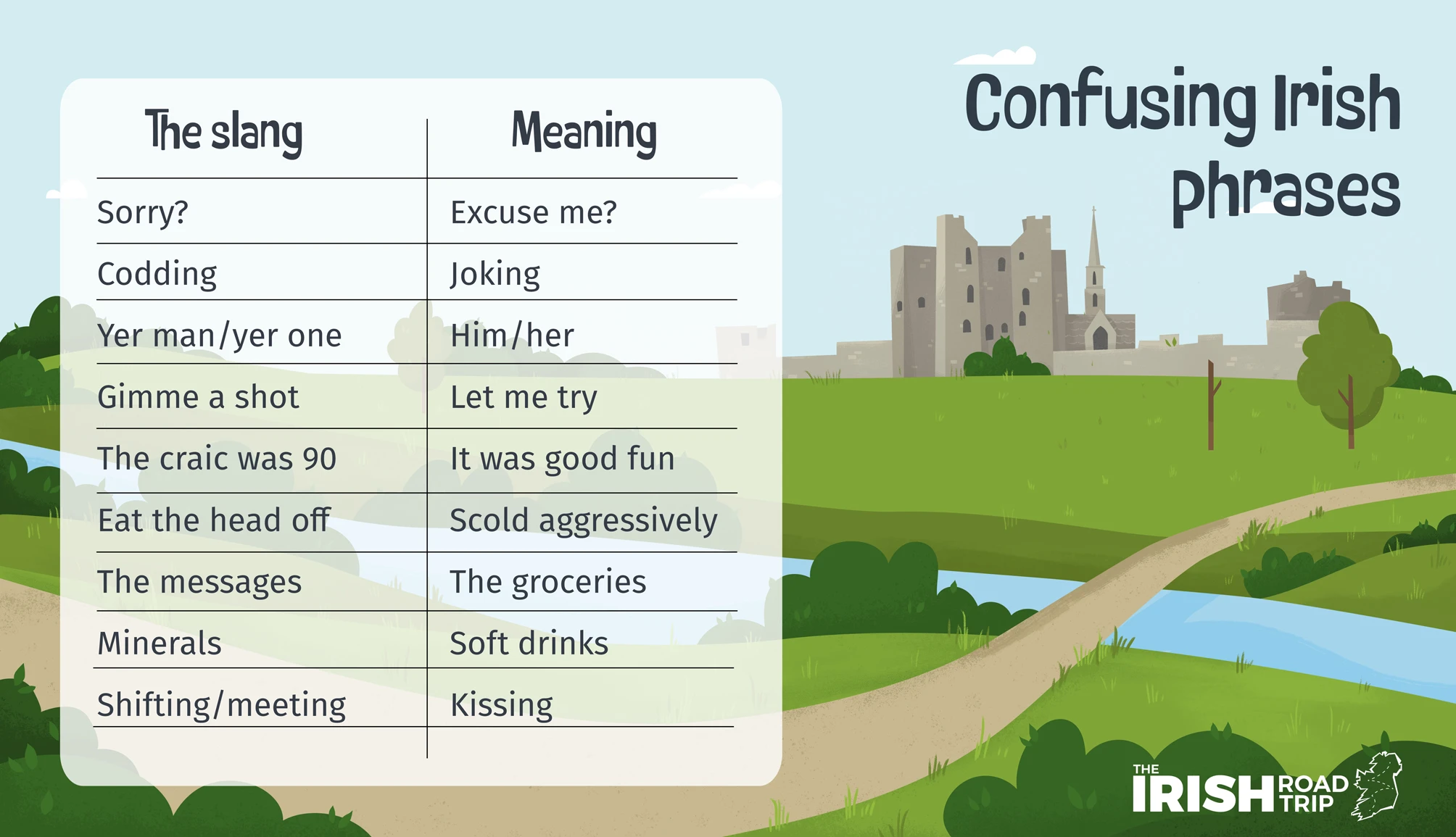
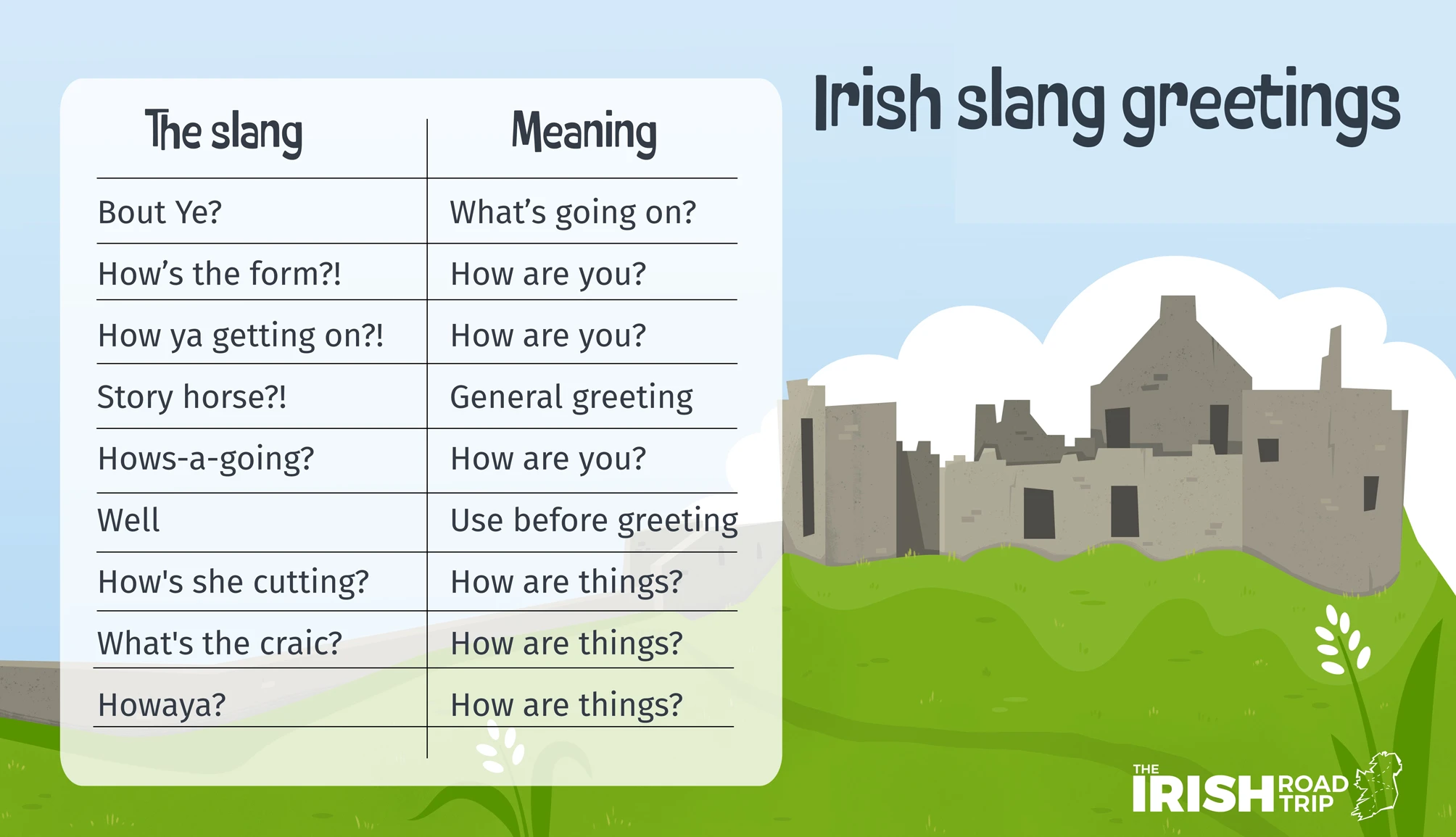

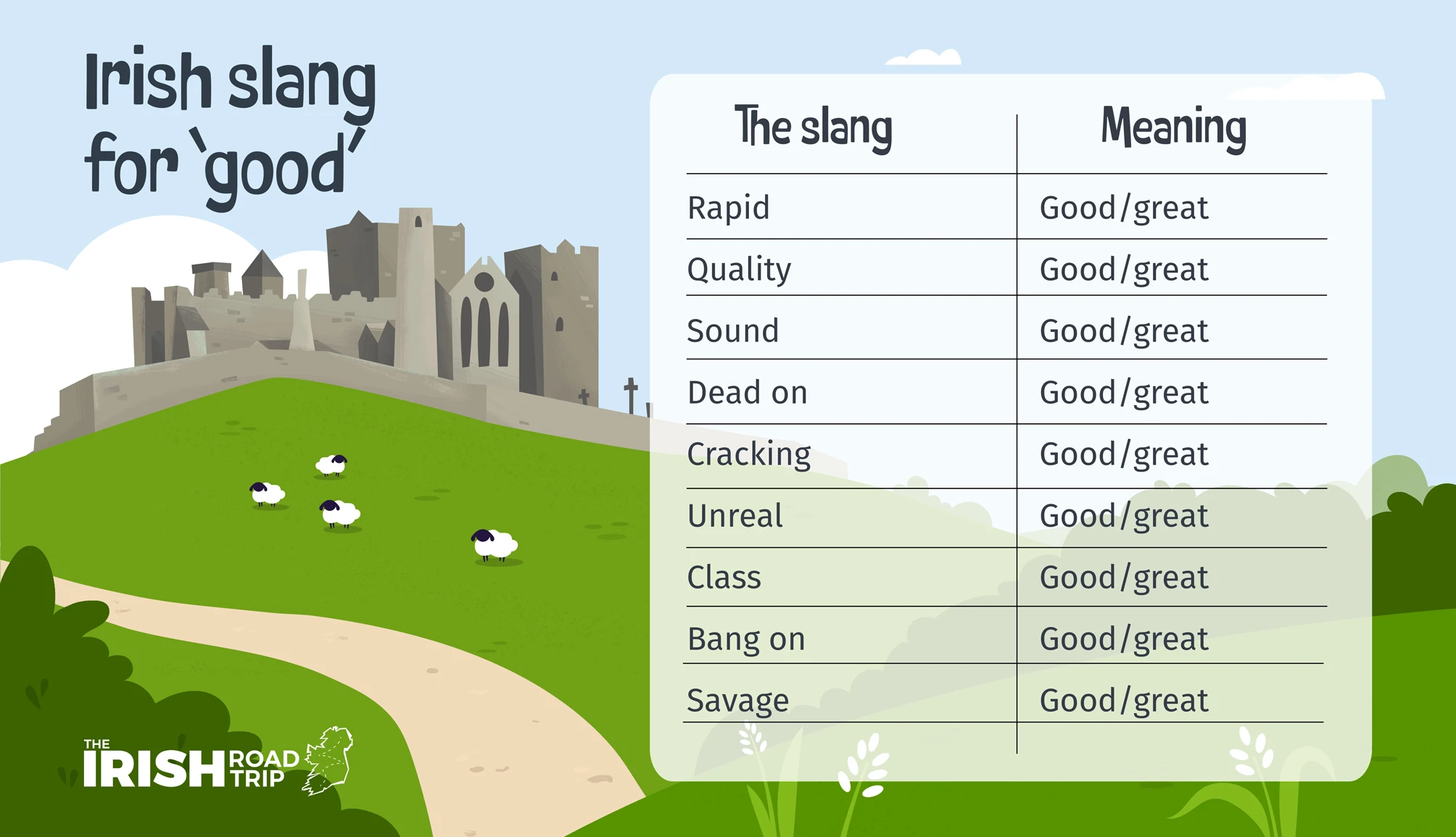
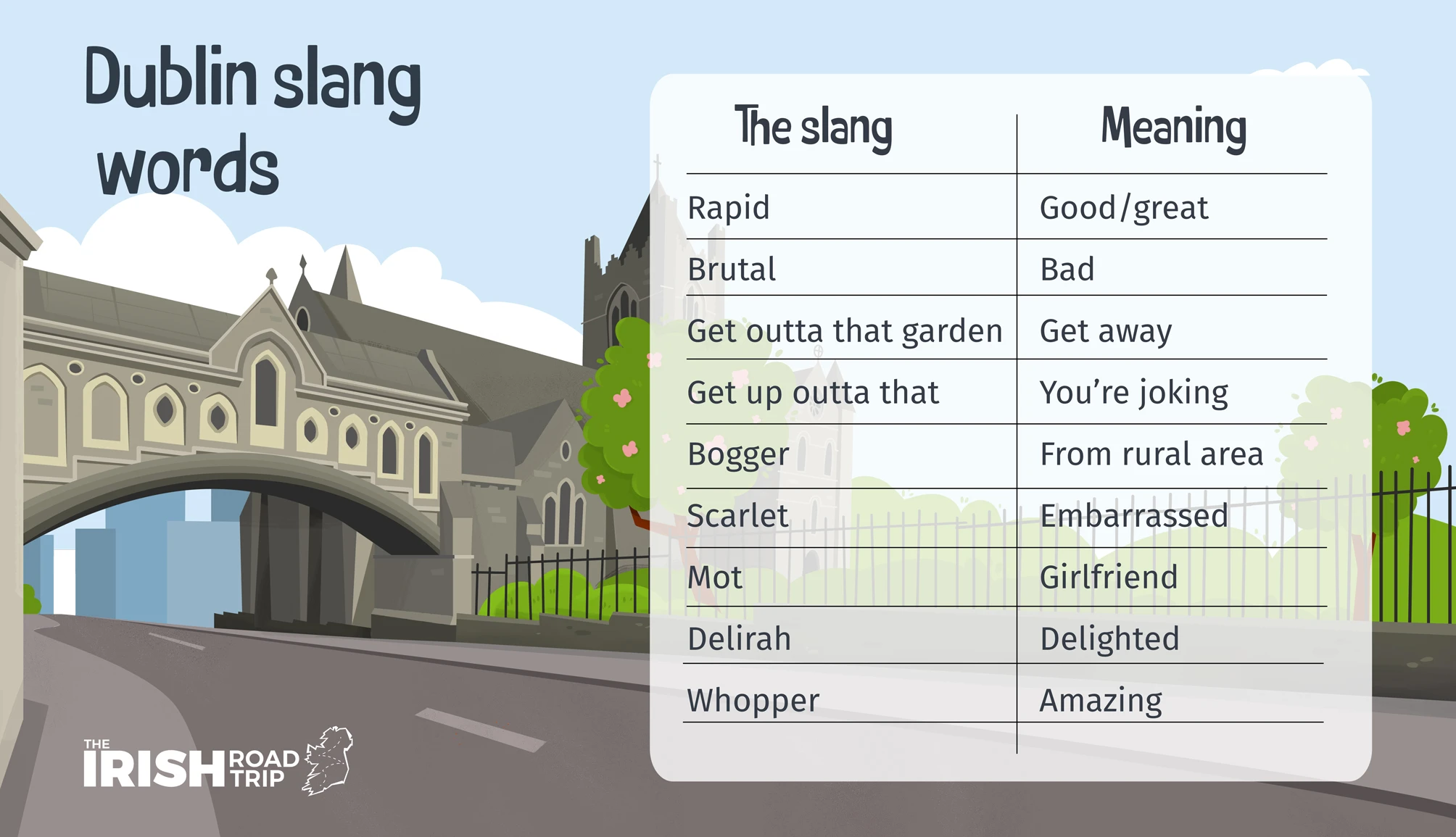
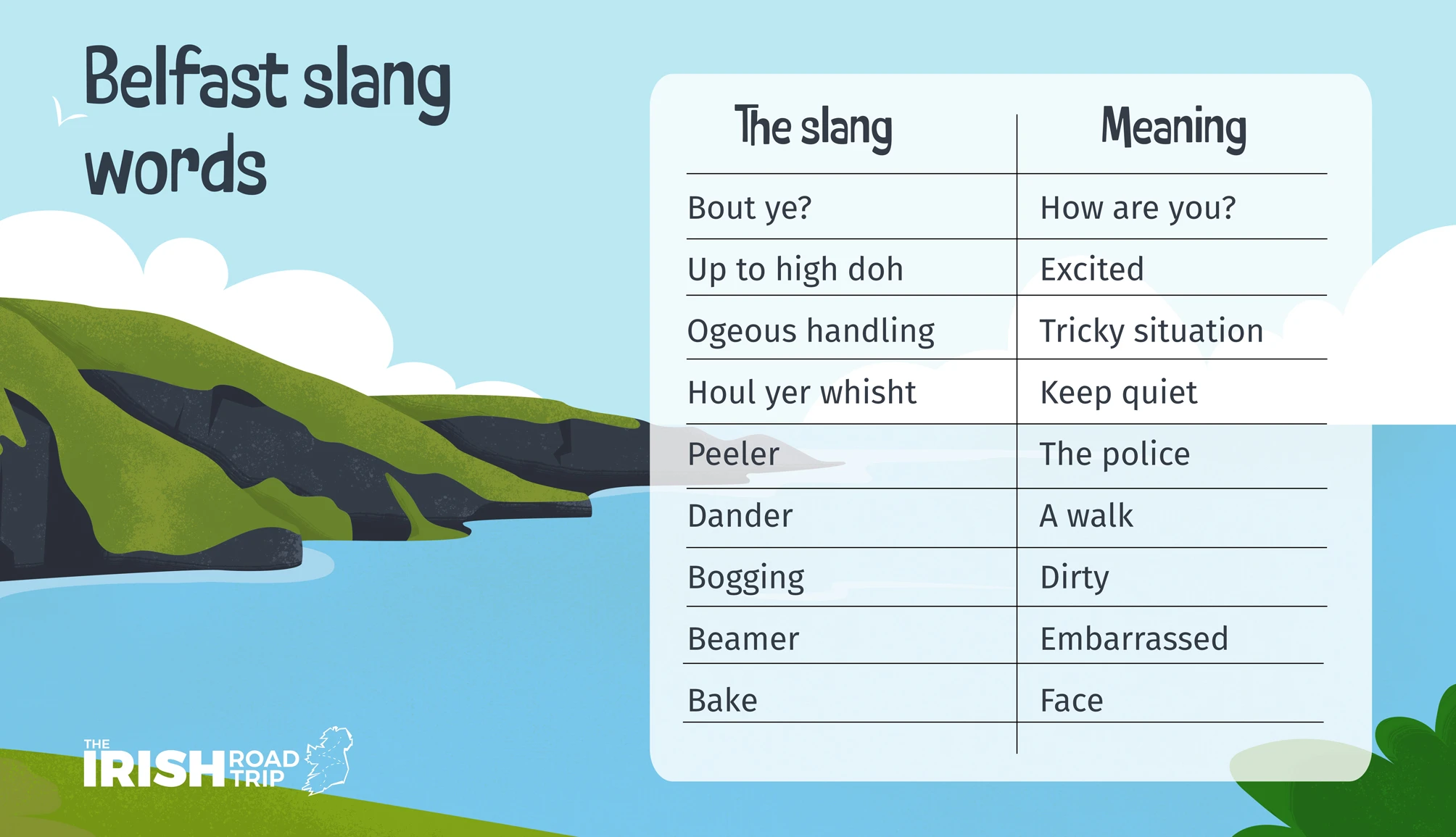
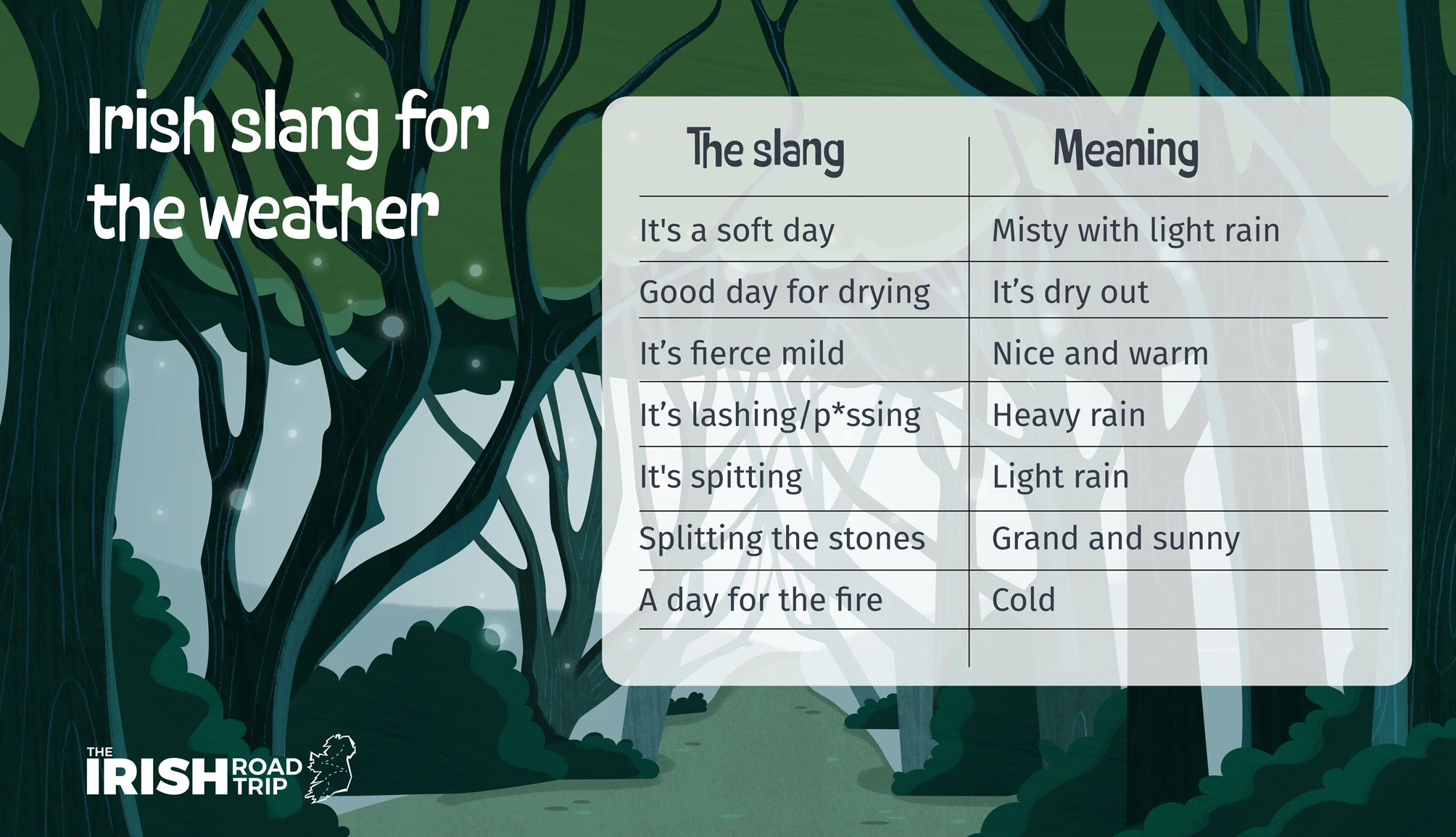
Frits van Halewijn
Thursday 2nd of November 2023
In Michael Magee's "Close to Home "there's a lot of Irish/Belfast slang. E.g. , I did not understand the word "beek" in the book. Can you explain?
Brendan Keane
Thursday 31st of August 2023
Latchiko is "half a ball-sack" (leath tíochóg) or cowardly.
Karen Johnston
Saturday 19th of August 2023
My mother used a term “bloody oonshuk” (that’s a phonetic spelling). She said it was like a gom. I know bloody is damn but not sure the other word. Are you familiar with it?
Anthony Kelly
Wednesday 26th of July 2023
13 thanks a million
I got caught out with a common problem when using Irish words on the phone and that is Autocorrect!!! The phrase in the previous comment below is “Go raibh míle maith agat”
Dr Jac
Wednesday 26th of April 2023
I'm a novelist and writing a series of books about an Irish family. Is there a word or phrase for a situation where someone had an accident and wasn't badly hurt, just a bump on this head?
Thank you.